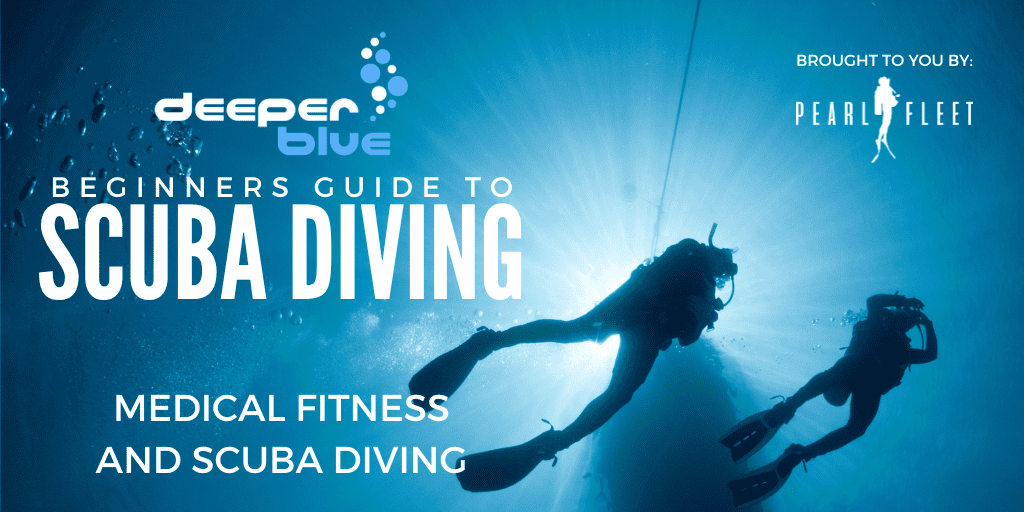This article is part of the Beginners Guide to Scuba Diving
If you’re a diver, sooner or later you’ll probably be faced with the question of whether or not you’re medically fit to dive. This is an important question to ask yourself, as diving can be dangerous if you’re not in good health. In this article, we’ll look at some things you need to consider when making your decision about diving medical fitness.
The medical community suggests that anyone who is going to start dive training should have a special medical exam before they start, and every five years if they are diving. In some countries such as Australia, it is a legal requirement to receive a diving medical before starting training.
The training agencies take a middle ground requiring a medical questionnaire to be completed and if any item is marked “yes” then a doctor must be consulted and issue a certificate stating the individual is cleared for diving. Many people will just read the questionnaire and mark “no” so they do not have to consult a doctor first. Doing so may put themselves at risk and others as well. Over 25% of serious diving injuries or death occur trying to help someone else.
Diving places the human body in an environment that is altered from normal conditions. Our bodies are used to having air pressure around them that is fairly consistent. The air above us asserts pressure on us. It may vary but the body will adjust. We say that the pressure on us at sea level is equal to one Atmosphere of Pressure or shorten to atm.
To reduce that pressure by 15%, we have to travel to an altitude of slightly over 5,000ft/1,500m. When we go underwater, the pressure increase. To increase the pressure on our body by 15% we only need to go down 5ft/1.5m. A shallow dive to 33ft/10m will have a pressure of 2 atm, double what is on the surface.
This depth is within the limits of an Open Water Diver. The maximum depth for recreational diving is 130ft/40m. At that depth, the pressure is at 5 atm. The changes in pressure at depth will affect the body, but for a healthy person, it will have little or no impact. However, certain illnesses and conditions can worsen as the body responds to the changes.

Diving Medical Fitness – Who Should Not Dive?
Medical studies have found that certain conditions and medications create a substantially elevated risk of serious injury or death when compared to a control group of people without the conditions. People with these conditions should not dive.
The following items are considered as Severe Risks and require a diving medical examination and it is unlikely that a doctor will approve diving but each case is different.
- Heart surgery
- Asthma – People with FEV1/FVC ratio below 75% cannot be considered fit for diving
- Serious lung or chest disease (particularly where surgery was involved)
- Pneumothorax (collapsed lung)
- Epilepsy and seizures, even when controlled by medications
- Diabetes that requires insulin
- Drug addiction
- Any condition that has a probability of unconsciousness
The questionnaire also will reveal medical items that are Relative Or Temporary Risks. These items may cause a moderate risk increase. As with the severe risk, a physician is required to make a clinical assessment of the diver. The exam will determine if the condition warrants no diving or if the increased risk is acceptable. A diver or student should not dive until they have had a diving medical.
The following conditions are some that may disqualify you from diving until a diving medical assessment is made:
- Frequent colds, hay fever or allergies, sinusitis, or bronchitis that cause difficulty in breathing even if controlled by medication.
- Mental or psychological problems (claustrophobia, agoraphobia, active psychosis, panic attacks)
- Complicated migraine headaches
- Clinically obese
- Fainting, Blackouts, or partial loss of consciousness
- Head injury with loss of consciousness in the past five years
- Sinus surgery, Ear disease, or surgery.
- Aneurysm
- Dehydration requiring medical intervention
- Past decompression sickness
- Inability to perform moderate exercise
- Recurrent back problems, or back or spinal surgery
- High blood pressure or taking medication to control it
- Heart disease, heart attack, angina, or blood vessel surgery
- Regularly taking prescription or non-prescription medication
If you fall into any of these situations do not despair, In many cases, doctors will allow clearance to dive. Each case must be examined carefully and it is best to go to a medical doctor who is also qualified in dive medicine. They understand better the conditions and can explore the options with you. They are able to explain the risk you will face and make you understand.
Some of the conditions may be reversible and the doctor can prescribe a course of action to bring the condition within the range of acceptability. Not trying to insult your general practitioner (GP) or family doctor, but diving presents some potential medical problems they may not be aware of, so it is best to go to a specialist.
The material presented here is from general information and layman knowledge to give you a basic understanding of the conditions that may keep you from diving or those that may have an increased risk.
Only a medical professional can evaluate your individual situation.
If you are learning to dive in an area that does not require a dive medical, you might want to consider having one anyway. If you have to pause and think about any of the questions on the questionnaire, error on the side of caution, answer yes and seek a dive medical professional.
Pregnancy
While an OB/GYN will frequently suggest an exercise program for women who are pregnant, scuba diving is not included. While no definitive studies have been done, the prevailing belief is that the effects of pressure on the baby’s development are too great to risk. Often cited is also the risk of unexplained DCS.
Diving Medical Fitness with disabilities
Adaptive technologies have opened up a number of sports for disabled individuals for a number of decades. Scuba diving has been slow to provide the tools necessary. That, however, is changing rapidly and in ways, many would not have imagined even a few years ago. The Handicapped Scuba Association (HSA) dates backs to a 1975 research program at the University of California-Irvine (UCI). It was focused on the self-image of individuals with physical disabilities.
In 1985, it had developed into a certification agency for people with disabilities and to certified “ dive buddies” for those disabled. In 2010, the Disabled Divers International (DDI) also started similar programs. In recent years the number of organizations for disabled divers has grown, and dive equipment manufacturers are designing scuba gear that is more useful for disabled divers.
The U.S. Military created a program at Walter Reed Medical Center called Soldiers Undertaking Disabled Scuba (SUDS). It was an element of rehabilitation programs for soldiers who lost limbs in combat. It was also found that it helped those who were suffering from post-traumatic stress (PTSD). Wounded Warriors is a non-profit organization who has expanded on the SUDS program for others suffering from PTSD and disabilities.
These organizations are not alone, more and more medical and non-profit organizations are taking on the task of bringing scuba diving to a broad range of those with physical and mental challenges.
You won’t know unless you ask.
While medical conditions may preclude you from diving, do not assume that it is the situation. A dive medicine doctor can advise you if diving is within your medical situation.
Click here for more articles in the Beginners Guide to Scuba Diving
Brought To You By
Our Beginners Guide to Scuba Diving is brought to you by Pearl Fleet. Pearl Fleet invites you to embark on their exquisitely crafted yachts for the finest diving experience the world has to offer. From purposefully designed diving itineraries to high-class amenities, Pearl Fleet’s immersive getaways allow you to indulge in your passion as you journey to world-class diving destinations. You can find out more at pearlfleet.org.


